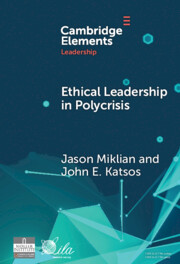Refine search
Actions for selected content:
20 results
The anxious a priori: an essay concerning science, law, and the temporal politics of the Anthropocene polycrisis
- Part of
-
- Journal:
- Global Sustainability / Volume 8 / 2025
- Published online by Cambridge University Press:
- 20 October 2025, e49
-
- Article
-
- You have access
- Open access
- HTML
- Export citation
Systemic risks and governance of the global polycrisis in the Anthropocene: stability of the climate–conflict–migration–pandemic nexus
- Part of
-
- Journal:
- Global Sustainability / Volume 8 / 2025
- Published online by Cambridge University Press:
- 24 September 2025, e39
-
- Article
-
- You have access
- Open access
- HTML
- Export citation
Introduction
-
- Book:
- Epochal Crisis
- Published online:
- 21 August 2025
- Print publication:
- 04 September 2025, pp 1-11
-
- Chapter
- Export citation
Entrepreneurial resilience in polycrisis: Adaptation via improvizational action, institutional workarounds, and strategic reconfiguration
-
- Journal:
- Journal of Management & Organization , First View
- Published online by Cambridge University Press:
- 02 September 2025, pp. 1-23
-
- Article
-
- You have access
- Open access
- HTML
- Export citation
Understanding polycrisis: definitions, applications, and responses
- Part of
-
- Journal:
- Global Sustainability / Volume 8 / 2025
- Published online by Cambridge University Press:
- 28 July 2025, e35
-
- Article
-
- You have access
- Open access
- HTML
- Export citation
Hollywood Is Burning: Imagery and Polycrisis
- Part of
-
- Journal:
- Public Humanities / Volume 1 / 2025
- Published online by Cambridge University Press:
- 24 June 2025, e107
-
- Article
-
- You have access
- Open access
- HTML
- Export citation
Systemic contributions to global catastrophic risk
- Part of
-
- Journal:
- Global Sustainability / Volume 8 / 2025
- Published online by Cambridge University Press:
- 23 June 2025, e19
-
- Article
-
- You have access
- Open access
- HTML
- Export citation
Dynamics of the polycrisis: temporal trends, spatial distribution, and co-occurrences of national shocks (1970–2019)
- Part of
-
- Journal:
- Global Sustainability / Volume 8 / 2025
- Published online by Cambridge University Press:
- 09 June 2025, e24
-
- Article
-
- You have access
- Open access
- HTML
- Export citation
A system of ups and downs: Roman rural landscapes in Northern Noricum
-
- Journal:
- Journal of Roman Archaeology / Volume 38 / Issue 1 / June 2025
- Published online by Cambridge University Press:
- 13 June 2025, pp. 79-116
- Print publication:
- June 2025
-
- Article
-
- You have access
- Open access
- HTML
- Export citation
Polycrisis patterns: applying system archetypes to crisis interactions
- Part of
-
- Journal:
- Global Sustainability / Volume 8 / 2025
- Published online by Cambridge University Press:
- 20 May 2025, e17
-
- Article
-
- You have access
- Open access
- HTML
- Export citation
How do crises spread? The polycrisis and crisis transmission
- Part of
-
- Journal:
- Global Sustainability / Volume 8 / 2025
- Published online by Cambridge University Press:
- 31 March 2025, e11
-
- Article
-
- You have access
- Open access
- HTML
- Export citation

A Climate of Truth
- Why We Need It and How To Get It
-
- Published online:
- 27 March 2025
- Print publication:
- 27 March 2025
Navigating systemic risks in low-carbon energy transitions in an era of global polycrisis
- Part of
-
- Journal:
- Global Sustainability / Volume 8 / 2025
- Published online by Cambridge University Press:
- 18 February 2025, e6
-
- Article
-
- You have access
- Open access
- HTML
- Export citation
The polycrisis and the uncertainty possibility space
- Part of
-
- Journal:
- Global Sustainability / Volume 8 / 2025
- Published online by Cambridge University Press:
- 18 February 2025, e4
-
- Article
-
- You have access
- Open access
- HTML
- Export citation
Not anxious enough: The discursive articulation of ontological security in the European Parliament
-
- Journal:
- Review of International Studies , First View
- Published online by Cambridge University Press:
- 11 November 2024, pp. 1-19
-
- Article
-
- You have access
- Open access
- HTML
- Export citation
2 - External Shocks
-
-
- Book:
- The Conservative Effect, 2010–2024
- Published online:
- 24 July 2024
- Print publication:
- 27 June 2024, pp 37-70
-
- Chapter
- Export citation

Ethical Leadership in Conflict and Crisis
- Evidence from Leaders on How to Make More Peaceful, Sustainable, and Profitable Communities
-
- Published online:
- 31 May 2024
- Print publication:
- 20 March 2025
-
- Element
-
- You have access
- Open access
- HTML
- Export citation
Polycrisis in the Anthropocene: an invitation to contributions and debates
- Part of
-
- Journal:
- Global Sustainability / Volume 7 / 2024
- Published online by Cambridge University Press:
- 17 January 2024, e5
-
- Article
-
- You have access
- Open access
- HTML
- Export citation
Global polycrisis: the causal mechanisms of crisis entanglement
- Part of
-
- Journal:
- Global Sustainability / Volume 7 / 2024
- Published online by Cambridge University Press:
- 17 January 2024, e6
-
- Article
-
- You have access
- Open access
- HTML
- Export citation
9 - Risks, Crises, and International Firms
- from Part III - International Organisation
-
- Book:
- International Economics and Business
- Published online:
- 21 December 2023
- Print publication:
- 21 December 2023, pp 239-264
-
- Chapter
- Export citation
